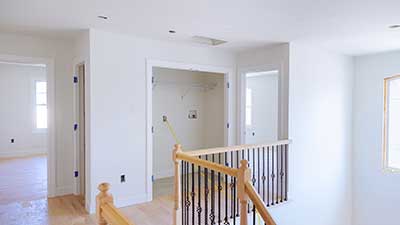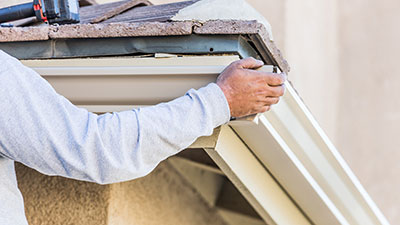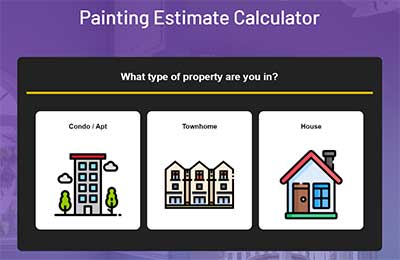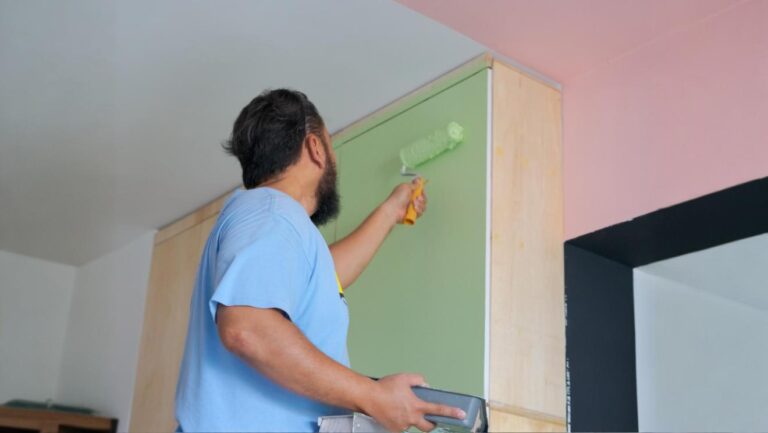
How to Prepare Against a Bad Contracting Experience
Let’s first define “bad”: bad is when you pay money and you get little or no value in return. It’s important to understand that things can always go wrong with great contractors, but a great experience comes from a contractor who does what it takes to fix issues with minimal change orders and answers their phone and works consecutive days.
With that in mind, let’s talk about how to prevent the worst-case scenario.
Using a Credit Card
The number one thing you can do is use a credit card. Whenever you give somebody cash or a check, if they run away and stop answering the phone, it is very difficult, if not impossible, to get that back. This can be tempting to do because often these are the contractors offering the absolute lowest pricing, but it also comes with the highest risk. Ironically, the companies you can trust the most with checks are ones that also are willing to accept credit cards. If somebody does not accept credit cards, it is a big red flag, unless you know the person well. For a few hundred dollars, it’s just not worth the risk.
Deposit and Payment Schedule
The next important thing would be the percentage of deposit and payment schedule. The more of a deposit you put down, the more at risk you are; the lower the deposit, the more at risk the contractor is. Let’s take the extremes. For example, if you pay 100% upfront, that obviously carries a lot of liability and doesn’t motivate the contractor to get the job done. If you pay 25% upfront for on-demand painters, for example, they will outwork that within a day and a half. This means that even if you’re unhappy with a job on day two or three, you’ve already received more work than what you’ve paid for.
Online Presence and Review Track Record
Next, look at their online presence and review their track record. This isn’t to say that you can’t be a reliable contractor without reviews, as some don’t understand technology very well. That being said, it is extremely hard to get great reviews in contracting, and so anybody that has an abundance of these is a good sign. Anybody who has a limited amount of bad reviews means they also do what it takes to make something right when something doesn’t go well.
Warranty
Finally, another thing to look at is a warranty. It is important to really understand that a warranty is only good if the company is still in business. If the company goes out of business, they are under no obligation to fulfill a warranty. In the painting industry, some people say, “Well, the paint is guaranteed for life.” But that’s for a manufacturer defect, not for poor labor and flaking paint. What you want to look for is a warranty on both labor and materials. Generally speaking, a one-year rock-solid warranty is good enough for painting, as you will typically see problems within 6 to 12 months if there is something wrong with the job. On-demand companies may offer three years, which is kind of overkill, but service and quality are something they stand by.
Signs of a Bad Contractor
In order to identify bad contractors and deal with them effectively, it’s crucial to recognize the warning signs. Here are some red flags to watch out for:
No Written Contract

A reputable contractor should always provide a legal contract detailing the scope of work, materials, costs, and a timeline for completion. If a contractor refuses to provide a contract or insists on a verbal agreement, this should raise a red flag.
Unprofessional Behavior
Professionalism is key in any business relationship. If a contractor shows up late to appointments, doesn’t return phone calls or emails promptly, or speaks rudely to you or their employees, it could be an indication of how they will handle the project. Trust your instincts and look for a contractor who demonstrates professionalism and respect.
Pressure to Make a Quick Decision
If a contractor pressures you to make a quick decision or commit to their services without giving you time to consider your options, be cautious. Reputable contractors understand that clients need time to make an informed decision and will respect your need for time.
Lack of References or Portfolio
A good contractor should be able to provide references from past clients and a portfolio of their previous work. If a contractor is unable or unwilling to share these resources, it could be a sign that they have a history of unsatisfactory work or unhappy clients.
Inconsistency in Estimates
When comparing estimates from different contractors, be wary of any that are significantly lower than the others. This could indicate that the contractor is cutting corners, using low-quality materials, or is inexperienced. Similarly, if a contractor’s estimate is vague or lacks detail, it may be difficult to know exactly what you’re getting for your money.
How to Deal with a Bad Contractor
If you suspect you’re dealing with a bad contractor, here are some steps you can take to protect yourself and resolve the situation:
Document Everything
Keep detailed records of all communication, contracts, and invoices. This will be crucial if you need to pursue legal action in the small claims court or file a complaint with a consumer protection agency.
Communicate Your Concerns
Before jumping to conclusions, calmly discuss your concerns with the contractor. They may be unaware of the issue or have a reasonable explanation. Open communication can help resolve misunderstandings and provide an opportunity for the contractor to address any problems.
Request a Meeting
If communication doesn’t resolve the issue, request a meeting with the contractor to discuss your concerns in person. Be prepared with a list of specific issues and any supporting documentation, such as photographs of poor workmanship or records of missed deadlines.
Seek Mediation or Arbitration
If the contractor is unresponsive or unwilling to address your concerns, consider seeking mediation or arbitration services to help resolve the dispute. Many trade organizations and consumer protection agencies offer these services, which can be a more cost-effective alternative to litigation.
File a Complaint
If your efforts to resolve the situation directly with the contractor are unsuccessful, consider filing a complaint with your local consumer protection agency or the Better Business Bureau. These organizations can investigate your complaint and, in some cases, help negotiate a resolution between you and the contractor.
Pursue Legal Action
In extreme cases, you may need to pursue legal action against a bad contractor. Consult with an attorney who specializes in construction law to discuss your options and the potential costs and benefits of pursuing a lawsuit.
Importance of Hiring Licensed Contractors

Hiring contractors with the proper licences is essential to ensure that your project goes smoothly and safely. Quality contractors have the proper training, experience, and qualifications to perform the work, which can give you peace of mind during the construction process. Additionally, reliable contractors are more likely to adhere to local building codes and regulations, reducing the risk of any legal issues that could arise from non-compliance.
When you hire a licensed contractor, you can expect them to:
- Obtain the necessary permits for your project
- Provide proof of insurance, which protects youand your property in case of accidents or damage
- Follow the appropriate safety measures and guidelines
- Ensure that the work meets the standards required by local building codes
Before hiring a contractor, make sure to verify their licensing status with the relevant state or local agency. This can help you avoid hiring unlicensed contractors who may provide substandard work or even put your renovation project at risk.
Ensuring Clear Communication and Proper Documentation
Clear communication and proper documentation are crucial when working with a contractor. A well-drafted contract, regular updates, and a clear scope of work can help prevent misunderstandings and keep the project on track.
- Draft a detailed contract: Before starting the project, make sure to have a written contract that outlines the project details, including the scope of work, payment terms, and timeline. This document should also include clauses to protect you in case the contractor fails to deliver on their promises or if disputes arise.
- Maintain a paper trail: Keep a record of all communication with the contractor, including emails, texts, and written notes from meetings. This can be useful if any disputes arise later on.
- Establish a clear scope of work: Before the project begins, ensure that both you and the contractor agree on the work that needs to be done. This should be clearly outlined in the contract, and any changes should be documented in writing
Taking Action if Problems Arise
Despite your best efforts, you may still encounter problems with a bad contractor. If this happens, it’s essential to take action to protect your interests and ensure the successful completion of your project.
- Address concerns promptly: If you notice any issues with the contractor’s work, address them immediately. Communicate your concerns clearly and professionally, and give the contractor a chance to rectify the situation.
- Withhold payment: If the contractor does not address your concerns or complete the work as agreed, you may need to withhold payment until the issues are resolved. Be sure to document your reasons for withholding payment and ensure that your actions are in line with the terms of the contract.
- Consult a construction attorney: If the dispute escalates and you cannot resolve it directly with the contractor, consider consulting a construction attorney for legal advice. They can help you navigate the complexities of the law and protect your rights.
Conclusion
Dealing with a bad contractor can be a frustrating and time-consuming experience. By taking proactive steps to identify and avoid unscrupulous contractors, you can minimize your risk and ensure a successful and positive construction project. Remember to use a credit card for payments, pay attention to deposit percentages and payment schedules, research a contractor’s online presence and reviews, and always have a warranty in place. By staying vigilant and informed, you can protect yourself and your investment from bad contractors.
Frequently Asked Questions
How do you tell a contractor their work is bad?
Addressing a contractor about poor work can be challenging but necessary. It’s important to be tactful, specific, and professional. Start by clearly explaining the issues with their work, providing examples, and discussing your expectations. Always keep the conversation focused on the work and not the individual.
How do you deal with a lousy contractor?
Dealing with a lousy contractor requires assertiveness and documentation. Communicate your concerns clearly, document all communication, and insist on a timeline for improvements. If the contractor fails to improve, consider terminating the contract, withholding payment, or seeking legal advice.
How do you deal with an arrogant contractor?
When dealing with an arrogant contractor, it’s crucial to maintain professionalism and stick to the facts. Focus on the project and your expectations, and avoid getting into personal conflicts. If the contractor’s arrogance affects the work quality or your relationship, consider finding a new contractor.
What should you not say to a contractor?
Avoid making derogatory comments, providing unrealistic expectations, or making payment promises you can’t keep. It’s also best not to disclose your budget upfront or share the lowest bid you received. Instead, focus on a productive, respectful dialogue that helps you and the contractor work towards a successful project outcome.
Tips for Managing Your Renovation Project with Confidence

To ensure the success of your renovation, it’s crucial to take an active role in managing the process from start to finish. Here are some tips to help you navigate the project with confidence:
Establish clear communication: Maintain open lines of communication with your contractor throughout the renovation process. This includes discussing your expectations, timeline, and budget upfront, as well as addressing any concerns or questions as they arise.
Stay organized: Keep track of important documents, such as contracts, permits, and invoices. This will make it easier to reference important information or resolve any disputes that may arise during the project.
Monitor progress: Regularly check in on the progress of your renovation project to ensure that everything is on track and meeting your expectations. Don’t be afraid to speak up if you notice any issues or have concerns about the quality of the work being done.
Be prepared for the unexpected: Renovation projects can sometimes uncover hidden issues or require adjustments to the original plan. Be flexible and prepared to make changes as needed, while keeping your budget and timeline in mind.
Inspect the work: Before making the final payment, thoroughly inspect the completed work to ensure that everything has been done to your satisfaction. If you find any issues, discuss them with your contractor and agree on a plan to address them.
By following these tips and working closely with your licensed contractor, you can ensure a successful and stress-free renovation project that meets your expectations and adds value to your home.


















